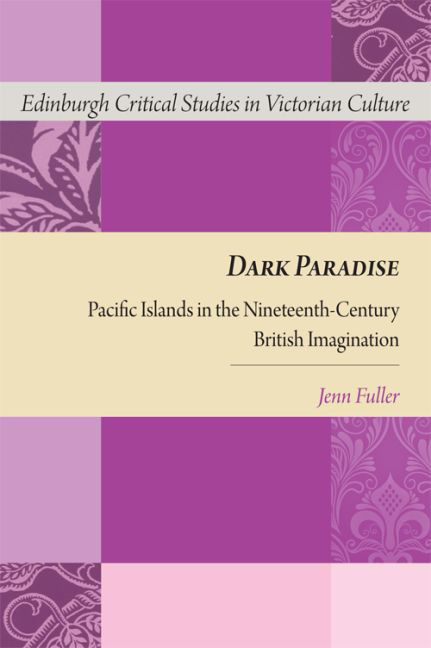Book contents
- Frontmatter
- Contents
- Series Editor's Preface
- Acknowledgements
- Introduction
- 1 Moving Missions and Novel Settlements: Early British Pacific Propaganda (1796–1866)
- 2 Adventures in the Pacific: The Influence of Trade on the South Seas Novel
- 3 Islands of Discovery: Scientific Curiosity in the Works of Darwin, Huxley and Wells
- 4 The Price of Paradise: Robert Louis Stevenson, Joseph Conrad and British Expansion in the Pacific
- 5 The Islanders Speak: Pacific Reflections in the British Press
- Bibliography
- Index
4 - The Price of Paradise: Robert Louis Stevenson, Joseph Conrad and British Expansion in the Pacific
Published online by Cambridge University Press: 12 September 2017
- Frontmatter
- Contents
- Series Editor's Preface
- Acknowledgements
- Introduction
- 1 Moving Missions and Novel Settlements: Early British Pacific Propaganda (1796–1866)
- 2 Adventures in the Pacific: The Influence of Trade on the South Seas Novel
- 3 Islands of Discovery: Scientific Curiosity in the Works of Darwin, Huxley and Wells
- 4 The Price of Paradise: Robert Louis Stevenson, Joseph Conrad and British Expansion in the Pacific
- 5 The Islanders Speak: Pacific Reflections in the British Press
- Bibliography
- Index
Summary
Introduction
By all accounts, 3 December 1894 was a solemn day in Upolu, Samoa. Along the high hillsides of Mount Vaea, only the sounds of men clearing a path to the summit broke the silence. Originally planned as a tribute to the strange white visitor who had made his home at an estate in Vailima, some forty island chiefs were now completing the lonely road. That visitor, the elusive Robert Louis Stevenson, had entrenched himself in Samoan affairs and become a fixture of the landscape, earning the poetic nickname Tusitala or ‘Teller of Tales’ because of his attempts to record, explore and relate stories of the South Seas. Ultimately, however, his time at Vailima was short; a mere four years after he settled in Samoa for health reasons, Stevenson succumbed to his lifelong illness and breathed his last. After finishing their sombre road to the summit, a party of Samoans carried the coffin of Stevenson up the mountainside, bidding farewell to their respected friend. Stevenson's funeral, like his life, was romantic and surprising, a fitting tribute to one of Britain's finest commentators on life in the South Seas.
Though he spent only a short time in the islands, Robert Louis Stevenson's work was the first to provide an in-depth and geographically specific criticism of British settlement in the South Seas. Stevenson's life in the Pacific has recently received new critical inquiry due to a surge of interest in the Pacific as a region and a revival of Stevenson criticism. Respected literary scholars Roslyn Jolly, Ann Colley, Timothy S. Hayes, Oliver S. Buckton and Robert Irwin Hillier, among others, have argued the for importance of Stevenson's South Pacific canon, providing new insights into and readings of these final works.
While this large body of scholarly work has provided multiple ways of interpreting Stevenson's work, few critics have noted that Stevenson brought an environmental sensitivity to his work in Samoa that seems in many ways ahead of its time. While I do not wish to argue that Stevenson was an environmentalist in our modern sense of the term, I do believe his works herald a growing interest in understanding the physical environment of the islands, and that he used the relationship between mankind and the landscape to comment upon his political and ideological goals.
- Type
- Chapter
- Information
- Dark ParadisePacific Islands in the Nineteenth-Century British Imagination, pp. 111 - 153Publisher: Edinburgh University PressPrint publication year: 2016



